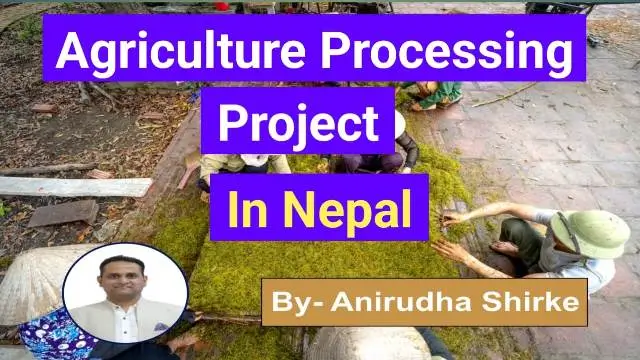
Agriculture has for a very long time been the spine of Nepal’s economy, engaging a large segment of the Nepali populace as well as adding value to the country’s GDP. Nonetheless, the industry has encountered many difficulties, including low productivity, a Limited Market, and poor infrastructure. In order to tackle this issue and leverage agriculture to the maximum, agriculture processing projects in Nepal are crucial.
Such projects contribute significantly to the processing of raw agricultural produce into value-added products, leading to higher market value and increased economic activity. In this paper, I provide an introduction, opportunities and advancements, job provisions, village-level benefits, governmental support, PPP Projects, agricultural processing GDP share, and sustainability of Agricultural Processing in Nepal.
Projects Related to the Agro processing Sector of Nepal
The Agro Processing Sector is engaged in converting raw agricultural products into finished, processed, and value-added forms. They include all types of projects related to agriculture from the processing of agricultural commodities (such as crops, fruits, and vegetables) to dairy and meat products. In Nepal, agriculture and agro-processing projects have been coming increasingly into prominence over the past couple of decades as they have the potential to answer many of the problems facing the Agricultural sector.
Potential of Agriculture Processing Projects
- Value Addition: Another advantage of Agro Processing is that it adds great value to unprocessed agricultural produce. These products can be processed further, which enhances product value and benefits the farmers with higher revenues.
- Market Expansion: By processing projects, farmers have the ability to reach beyond a narrow local market, to national and international markets. They have a longer shelf life, and they’re generally lighter and travel farther, allowing them to be purchased in distant locations.
- Waste Reduction: Processed produce can make use of surplus and Imperfect Produce (food with physical problems), resulting in a reduction of post harvest losses. It minimizes the waste of food, which leads to food security as well.
- Diversification: It promotes diversification in agriculture and allows farmers to try out new crops and agro-processing products instead of depending on only one.
- Employment Generation: The agriculture processing projects provide employment at multiple points in the value chain, including processing units, distribution, and marketing.
Opportunities and Challenges
Opportunities:
- Export Potential: The processed agricultural products have a great export capacity, especially for neighbouring nations such as Indian and Chinese markets.
- Technological Advancements: Efficiently handling this has become easier with the development of technologies, giving rise to increased quality results and lowered manufacturing costs.
- Government Initiatives: This is due to the fact that the Nepalese Government encourages Agricultural Processing projects through grants, corporation tax relaxation, and credit facilities.
Challenges:
- Infrastructure: The lack of Transportation and Storage infrastructure makes it difficult to run processing facilities smoothly.
- Access to Finance: Lack of finance is seen as one of the crucial issues for small scale farmer entrepreneurship in this domain.
- Quality Control: Quality control is difficult, which is integral to gaining and maintaining trust in ultra-processed foods.
Employment Generation and Rural Development
There is huge potential for job creation and rural development through agriculture processing projects in Nepal. These programs employ people at all stages, from manufacture to processed packaging, transport, and sales. Jobs are not just in cities either; we can bring significant value to places much farther off the beaten path too. The expansion of these processors in the countryside fosters economic production, reduces emigration towards the city, and improves living conditions in rural environments.
Public-Private Partnership (PPP) Agroprocessing Projects
Agricultural processing is imperative for Nepal, and PPP projects can be extremely important. In these partnerships, the Government collaborates with private sector organizations to set up and operate the treatment facilities. It involves the Government facilitating infrastructure and providing incentives and policy frameworks, while the private sector brings its investment technology and know-how. The advantage of PPPs is their ability to combine resources and expertise, resulting in more cost-efficient and green refining facilities.
Government Support
The government of Nepal encourages agricultural processing projects, and it has been providing numerous facilities for the development of such projects. These measures include:
- Subsidies: Subsidy for machinery, equipment, and infrastructure development of processing units.
- Tax Incentives: Tax relaxation for agriculture processing was granted under special provisions.
- Credit Facilities: Processing projects also attract access to credit facilities at concessional interest rates for entrepreneurs and farmers.
- Research and Development: The government invests in technology development (to increase process efficiency) and quality development.
- Market Access: Measures are taken to simplify the way to enter processed agriculture commodities markets through trade deals with neighbouring countries.
Agroprocessing Contribution to GDP
Agro processing is one industry that can play an important role in increasing Nepal’s GDP and transforming Nepal. These projects generate more for farmers by increasing the price of Agricultural items. Plus, employment from processing plants pushes up consumer outlays, fuelling more expansion. With its expansion of domestic market coverage and access to global markets, it is likely to become an equally important earner of foreign exchange.
Sustainable Agriculture
Agriculture processing projects need to take sustainability seriously in Nepal. Given the delicate environment in which this ecosystem operates, it is paramount that the processing does not cause any environmental damage or deplete natural resources. Sustainable Agriculture processing projects focus on the following:
- Resource Efficiency: Utilization of water, energy, and all other resources in an efficient manner to mitigate waste and lower the carbon footprint
- Environmental Conservation: Practices that save the environment, such as waste management and pollution control, should be put in place
- Community Engagement: Incorporating national neighbourhoods into the tasks and guaranteeing that their necessities and environmental worries are considered
- Certifications and Standards: Certified according to internationally recognized sustainability norms and obtain access to worldwide markets.
Potentials abound there for transforming Nepal’s agriculture sector through agro-processing projects. They provide scope for value addition, diversification from mainstream agriculture, livelihood opportunities, job creation, and rural development. These projects require public private partnerships, government assistance, and environmentally friendly methods. Processed agriculture holds the key to Nepal’s economy in terms of GDP growth and sustainable agriculture, along with the improved lives of rural farmers contributing to the overall development of Nepal.
